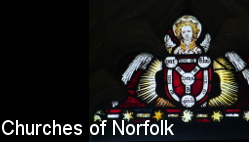| |
|
St
Nicholas, Dilham I had remembered St Nicholas, but coming
back this way in 2019 I couldn't find it, and it took a
patient old local in Dilham village a couple of miles off
to set me right. And yet, I should have remembered where
it was, for St Nicholas is visible off in the fields to
the north of the village from the Wroxham road, appearing
odd from this angle, and you need a second glance to
reassure yourself that it really is a church. There is a
truncated round tower which has all the appearance of a
vast flower vase, and as you leave the road up the tiny
lane and get closer you can see the clean lines and
unknapped flint that suggests a considerable restoration.
In fact, nothing that you see is ancient, and virtually
all of it is 20th century. The church was rebuilt in the
1930s, and the stump of tower comes from only a hundred
years earlier. I'm not convinced that it has ever been
any higher, and I think the 'ruins' against the west wall
were a folly. And this isn't the first time that history
has been effaced and reimagined at Dilham, for the
medieval building was demolished in the 18th century and
replaced with what was a new building for then. This
appears to have been done on the cheap, and 19th century
additions and elaborations, like the round tower, could
not prolong its life. So, it was demolished and
completely rebuilt, the stump retained as a baptistery.
When you know this, you can see at once the clean 1930s
lines, the Gothic revival stripped of all Victorian
neuroses. Inside and out, there is a modernistic
simplicity to this articulate rendering of Norfolk
vernacular. Even the angel roof is understated. An
American correspondent of mine, on seeing these pictures,
said that it was like a college dining hall, and I think
that is exactly right.
St Nicholas successfully combines this simplicity with an
air of Anglo-catholic devotion, including stations of the
cross. The only disappointment is the insipid crucifixion
in the east window. Mercifully for them perhaps, the
workshop that produced it does not appear to have been
recorded. Survivals from the old church include a
medieval font and the organ, and a large piece of lead
set in a wooden frame. It has a long Latin inscription on
it, and seems to be from the roof of the previous church,
since it describes the demolition of the old west end and
the building of the round tower in 1835. All in all this
is a pleasing little church, a simple yet splendid modern
building set alone in the barley fields, well used, much
loved, and open to pilgrims and strangers every day.
Simon Knott, December 2019
Follow these journeys as they happen at Last Of England
Twitter.
|
|
|
